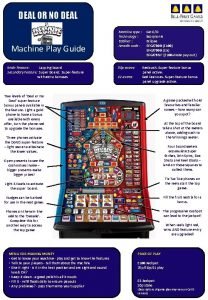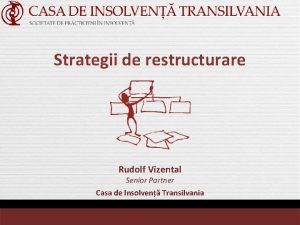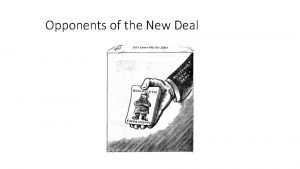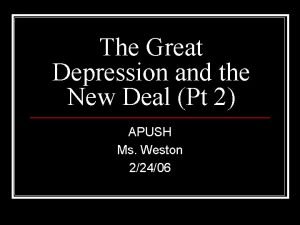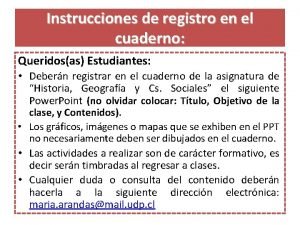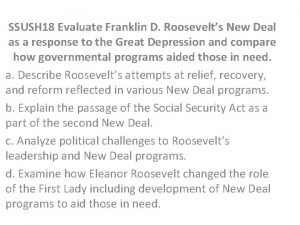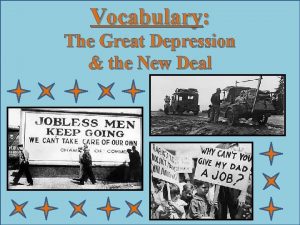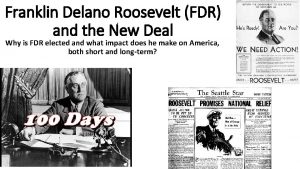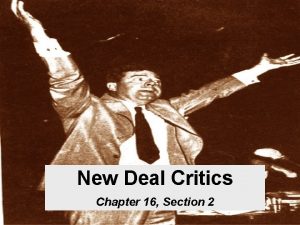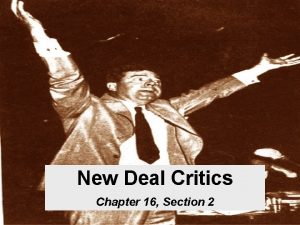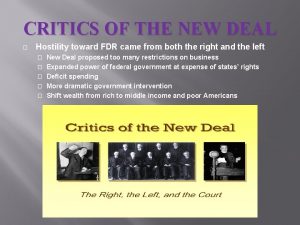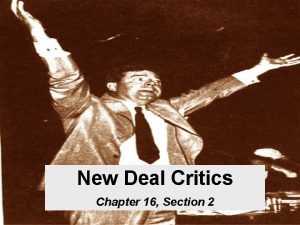Critics of the New Deal Critics of the








- Slides: 8

Critics of the New Deal

Critics of the New Deal Women and African Americans: They believed that New Deal programs offered more opportunities to white men than to women and minorities. Women and African Americans were frequently paid less for the same work. Republicans and other political opponents: They believed the government was becoming too powerful and that the Constitution was threatened. They also believed that FDR was like a dictator. Further, they argued that New Deal taxes on the wealthy are unfair and that New Deal programs were too much like socialism.

Critics of the New Deal Communists: Offered alternatives, but failed to gain any major public support. In 1938, the party had only 55, 000 members, and in the election of 1936 won just 80, 000 votes. Socialists and Progressives: led by Eugene V. Debs and Norman Thomas (the party’s presidential candidate). Socialists believed in use of democratic means to make changes to the American economic structure. However, some members voted for FDR anyway. They believed that New Deal programs were not enough to solve the nation’s problems and more should be done to distribute the nation’s wealth among all Americans.

Individual Critics of the New Deal As frustration grew because of prolonged depression, many individuals entered the political scene, each criticizing the New Deal and offering solutions to the economic crisis: � Francis E. Townsend, created a financial plan to provide government pensions for the elderly. � Father Charles E. Coughlin, a Catholic priest who blamed business owners, especially Jewish ones, for the economic crisis. � Huey Long, a powerful U. S. senator from Louisiana who proposed income and inheritance taxes on the wealthy to be used to give each American a $2, 500 income, a car, and college education. Long was assassinated in 1935.

FDR’s Court-Packing Plan Supreme Court opposed many of FDR’s programs and consistently vetoed some New Deal legislation. The Supreme Court ruled several key laws unconstitutional: NRA: (National Recovery Act) was declared unconstitutional because it gave Congress the power to regulate intrastate commerce (commerce within a single state) and violated the separation of powers. AAA: (Agricultural Adjustment Act) was struck down because the court believed that agriculture was a local, not an interstate matter, under the 10 th Amendment. FDR asked Congress to approve a law that would allow the president to increase the number of judges from nine to fifteen if judges refused to retire at age 70. The Judicial Reorganization Bill became known as the “Court-packing” plan and was intended to make the Supreme Court approve New Deal laws. It never became law, threatening the separation of powers.



